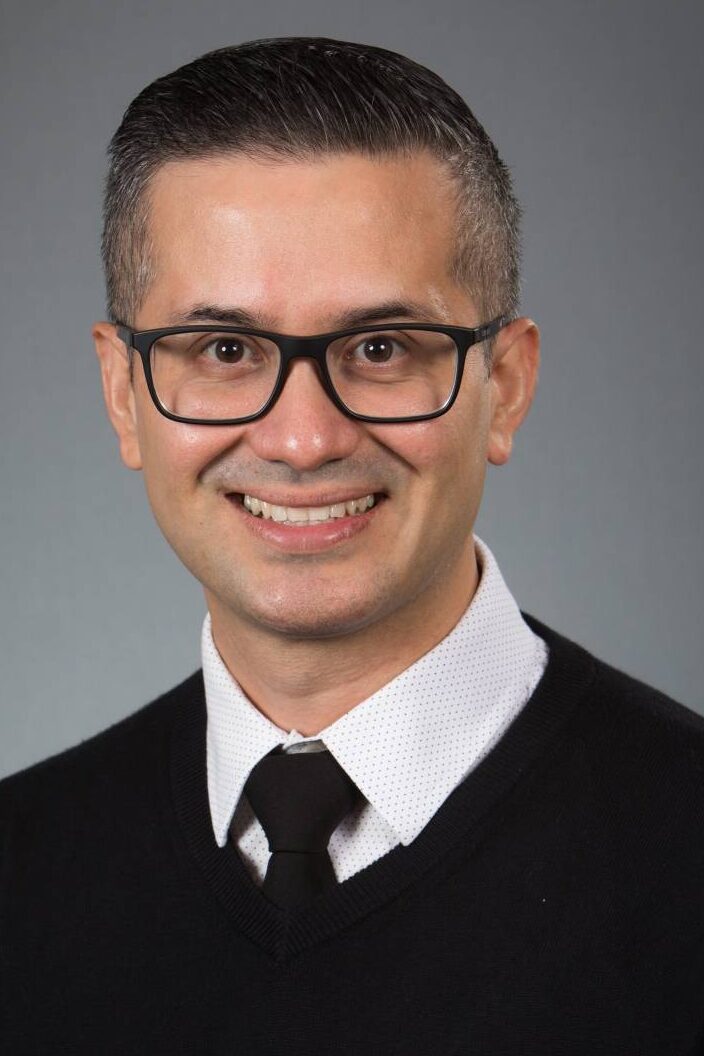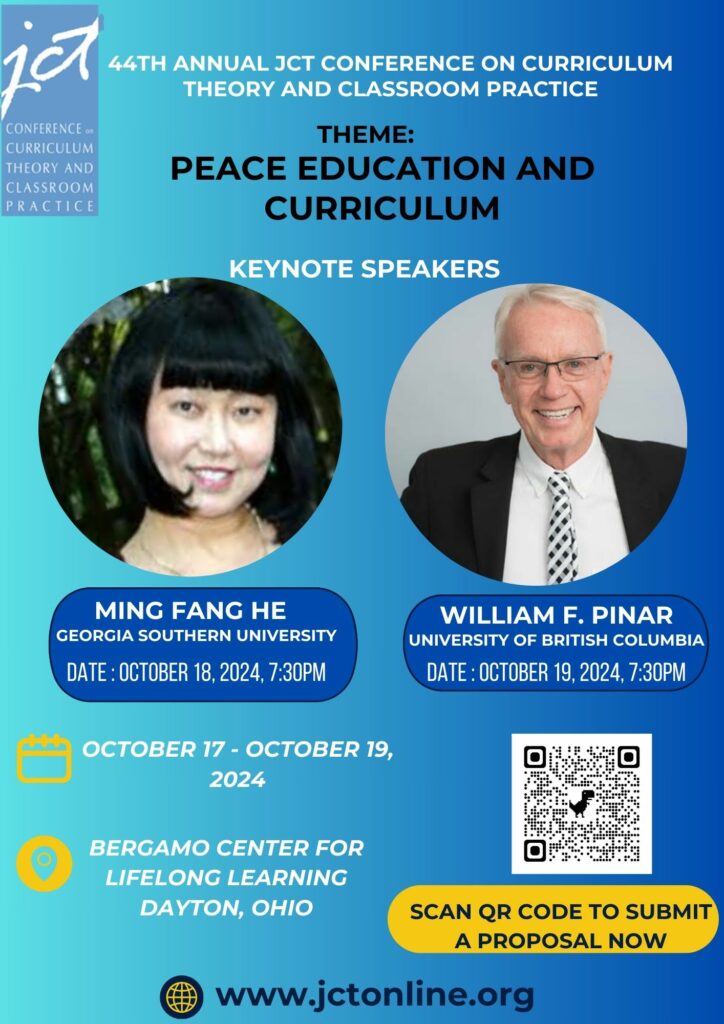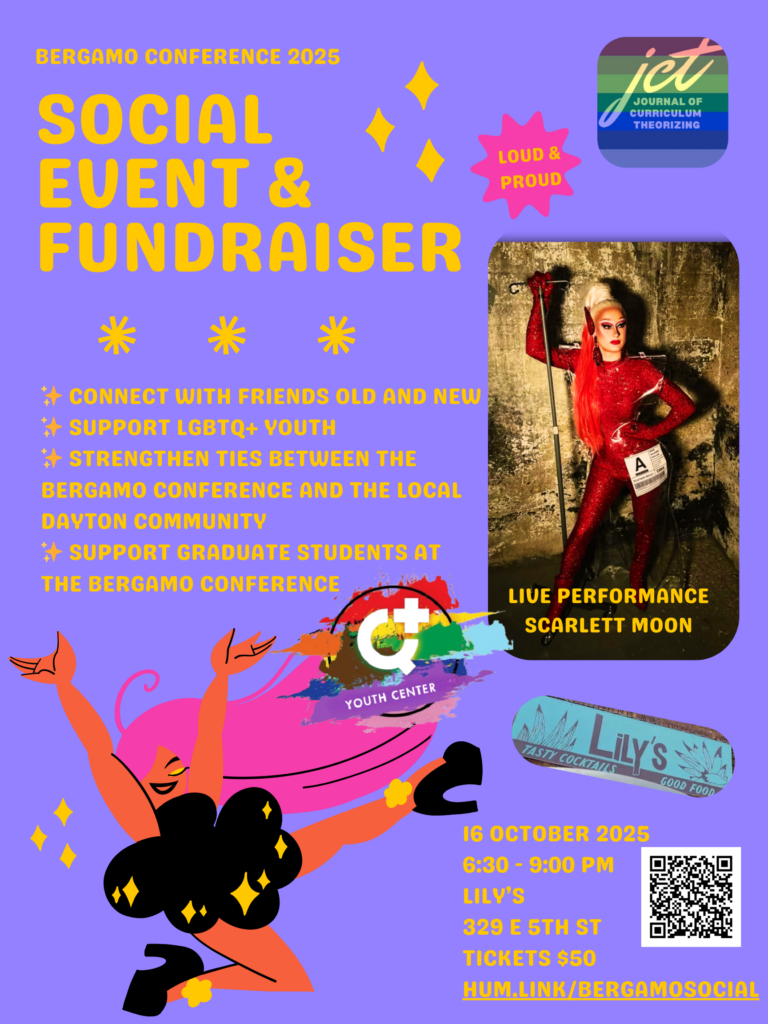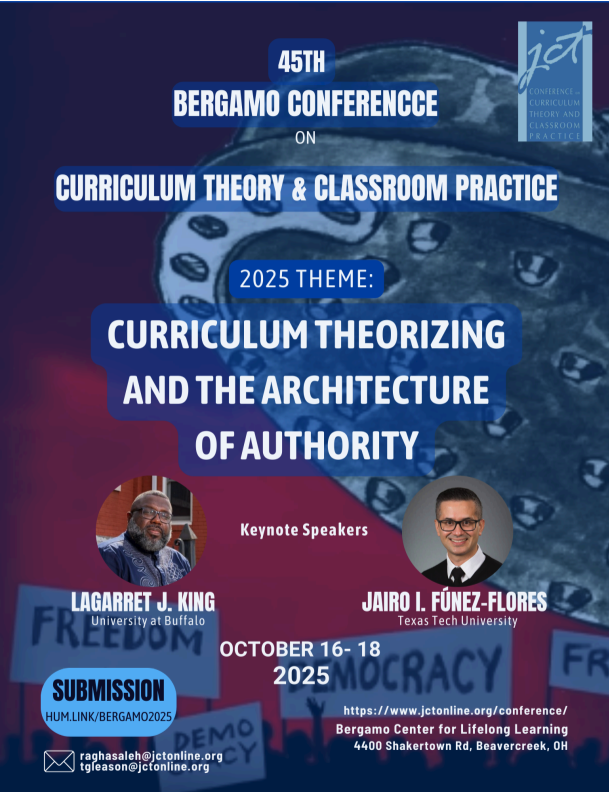2025 Bergamo Conference Highlights
Keynote Addresses
Friday, 7:30-9:00 PM, Roncalli Assembly
“Black Scare, Critical Hope, and Protecting Black History: Black History Interventions During Times of Political and Divisive Rhetoric”
LaGarrett King, University at Buffalo
Biography:

Dr. LaGarrett J. King is an award-winning Professor of Learning and Instruction and Director of the Center for K-12 Black History and Racial Literacy Education at the University at Buffalo. He is the author of over 70 publications, including 4 books. His most recent book, Teaching Black History for Grades 6-12: An Introduction to the Black Historical Consciousness Framework, will be published in 2026. The book, co-authored with Abigail Henry, explores his Black History Framework that has been adopted in several school districts across the United States and Canada. Dr. King lives in Buffalo with his wife, Dr. Christina King, and 2 children, Preston and Presley. He enjoys movies, working in his yard, attending high school athletic events, and most importantly, being quiet.
Saturday, 7:30-9:00 PM, Roncalli Assembly
“Curriculum Theorizing in a Time of Genocide, Scholasticide, and (Counter)Insurgency”
Jairo Fúnez-Flores, Texas Tech University
Biography:

Jairo I. Fúnez-Flores is an Assistant Professor of Curriculum Studies and Teacher Education. Specializing in curriculum studies, decolonial theory, and critical ethnography, his research explores the pedagogical possibilities emerging from student movements and activist spaces. He is a founding member of the Faculty and Staff for Justice in Palestine at Texas Tech University and EdScholars4Palestine. Currently, he is advancing what he calls insurgent decolonial theory to situate thought in sites of struggle. His work has been published in Theory, Culture & Society, Globalisation, Societies and Education, Sociology Compass, and Educational Studies. Dr. Fúnez-Flores is also the co-editor of the Bristol University Press book series Decolonization and Social Worlds, lead editor of the Routledge book series Decolonial Entanglements: Praxis, Pedagogy, and Social Theory, and lead editor of the SAGE Handbook of Decolonial Theory.
Opening Remarks
Thursday, 12:00 – 1:00 PM, Darby

We are honored to welcome Mayor Jeffrey J. Mims, Jr., a lifelong educator and civic leader, to offer opening remarks. Mayor Mims brings decades of experience as a teacher, union leader, school board president, and now as Dayton’s mayor. His presence underscores the deep connections between curriculum theorizing and the lived realities of our communities. As the conference enters its 45th year, the Foundation for Curriculum Theory and JCT are renewing our commitment to collaboration with Dayton and Ohio communities, educators, and schools. Mayor Mims’s words will help ground our gathering in the local context and inspire us to build stronger bridges between scholarship, practice, and public life.
Constellations of Authority and Liberation: Mapping Curriculum Futures Together
This opening session stages a collective act of constellation-making and reading to engage the 2025 Bergamo Conference theme, Curriculum Theorizing and the Architecture of Authority. Drawing on legacies of past Bergamo thinkers and present struggles over curriculum, participants will map oppressive architectures alongside liberatory counterforces to imagine new alignments of power, pedagogy, and possibility. As constellations emerge, they illuminate how curriculum theory helps us reorient toward more just and hopeful futures.
Tristan Gleason, California State Polytechnic University- Humboldt
Rouhollah Aghasaleh, California State Polytechnic University- Humboldt
Jody Googins, Xavier University
Vanessa Winn, University of Dayton
Sandra Vanderbilt, George Washington University
Asilia Franklin-Phipps, SUNY New Paltz
Provoking Dialogue(s)
Thursday, 4:15–5:45 PM, Roncalli Assembly ASSEMBLY
Foucault in Education: Generative Dialogues on Power, Knowledge, and Resistance Across Theory, Practice, and Method
Dialoguers:
Tristan Gleason, California State Polytechnic University- Humboldt
Rouhollah Aghasaleh, California State Polytechnic University- Humboldt
Jim Burns, University of New Mexico
Chris Kirchgasler, University of Wisconsin-Madison
R. Allen Smith, UNC School of the Arts
Mariam Sedighi, American University of Iraq-Baghdad
Mathew Cook, Mercer University
Robert J. Helfenbein, Mercer University
Abstract
This provoking dialogue, inspired by the forthcoming Bloomsbury Handbook of Foucault and Education: Exploring Perspectives and Practices, explores how Foucauldian philosophies enable educational researchers to think critically and historically about the present. Contributors interrogate epistemic, institutional, and political conditions while mobilizing Foucault’s ethos of inquiry to problematize the self-evident and open spaces for alternative futures. Rejecting fixed methods, the session embraces plural genealogies that nourish praxis and resist totalizing interpretations.
Friday, 4:15–5:45 PM, Roncalli Assembly ASSEMBLY
Public Spaces, Politics and Policy: A Post-script
Dialoguers:
Todd Alan Price, National Louis University
Sandra Vanderbilt, George Washington University
Cooper Sved, George Washington University
Laura Jewett, The University of Texas Rio Grande Valley
Abstract
This panel offers a post-script to the recently released Public Spaces, Politics and Policy: Historical Entanglements with Irrational Momentism (2025), which frames contemporary education as shaped by “irrational momentism”, toxic politics reduced to sound bites and viral outrage that displace meaningful dialogue. The authors argue that under the current reactionary administration, policy has shifted from informing curriculum and pedagogy to controlling and predetermining what schools and society are allowed to be.
Saturday, 4:15 PM – 5:45, Roncalli Assembly ASSEMBLY
“Closeness to the Land”:
A Multimedia Evening of Palestinian Art, Film, and Poetry
Dialoguers:
Rouhollah Aghasaleh, California State Polytechnic University- Humboldt
Mandy Shunnarah, Freelance Writer
Mona Gazala, The Gazala Projects
NourEddine Hijazi, Activist
AJ Watts, Activist
Sandra Vanderbilt, George Washington University
Abstract
This Provoking Dialogue is a multimedia evening event highlighting Palestinian-American voices rooted in Ohio. Through film, visual art, and spoken word, the program explores displacement, resistance, erasure, and rootedness. Artist and activist Mona Gazala will curate short films (6000 Miles, Asymmetry) examining U.S.–Palestine entanglements and present an art installation on text and urban geographies. Mandy Shunnarah, Palestinian-Appalachian poet, will read from their 2025 We Had Mansions. NourEddine Hijazi will share original and inspired poetry on Gaza, and AJ Watts will perform spoken word. The evening concludes with a community conversation connecting artists, educators, and scholars.
Thursday 6:30 – 9:00 pm
Join us for a lively social fundraiser at Lily’s (329 E 5th St), located just 7 miles—about a 14-minute drive—from the Bergamo Center.
The dinner event will take place at Lily’s, a local Dayton restaurant located about 15 minutes away from the Bergamo Center, and will feature entertainment by local drag artist Scarlett Moon. Tickets for the event can be purchased via the link below for $50. The ticket price includes a 3-course meal option from Lily’s (choice of appetizer, entrée, and dessert), and $30 from each ticket sale will go directly to the restaurant. The remaining $20 from each ticket will be donated to the Q+ Youth Center, a Dayton organization dedicated to providing a safe and inclusive space for LGBTQ+ youth to thrive. In addition, there is an option when purchasing tickets to add a donation to the Foundation for Curriculum Theorizing (FCT), the non-profit organization that provides financial support for the Journal of Curriculum Theorizing and the Conference on Curriculum Theory and Classroom Practice. Donations to the FCT will help offset the cost of this year’s prorated registration prices and discounted registration for graduate student volunteers. We hope this event will provide an opportunity to socialize with friends old and new, and will strengthen connections between the Bergamo Conference and the local community. Come enjoy delicious food and merriment while supporting queer youth and the FCT!
?? Register now
?? Save your seat for the Social Event
2025 Bergamo Conference Registration
October 16–18, 2025 | Bergamo Center for Lifelong Learning, Dayton, Ohio
We’re thrilled to announce that registration is now open for the 45th annual Bergamo Conference on Curriculum Theory and Classroom Practice.
Click here to register
Tiered Registration Rates
In keeping with our commitments to equity and access, we’re offering self-reported, tiered registration. We trust our community to choose the rate that best aligns with their current professional and financial context:
- $125 – Student (Undergraduate or Graduate)
- $150 – Adjunct / Independent Scholar / Unwaged
- $175 – K–12 Teacher / Community Educator
- $200 – Early Career Faculty / Postdoc / Non-Profit Affiliate
- $225 – Tenured Faculty / Mid-Level Professional
- $300 – Administrator / High-Income Attendee
We encourage early registration and invite you to share the link with colleagues, collaborators, and fellow curriculum theorists.
This helps us provide Bergamo with accurate numbers for food preparation and ensures a smooth experience for everyone. After October 5, 2025, registration will move to a flat $250 rate for all attendees, and late registrations place an added burden on the Bergamo Center staff.
Note: Registration and payment for the conference will be processed through the Zeffy website. Please notify us promptly if you encounter any issues with the Zeffy payment site. Any conference attendees needing assistance utilizing the Zeffy website may contact us at raghasaleh@jctonline.org or 707-826-3728.
Student Engagement & Volunteering
Keep an eye out for our upcoming Student Council and volunteer opportunities. Volunteering is a powerful way for students to connect with the community, and includes a discounted registration rate for those who assist with conference staff.
2025 Call for Proposals
45th Annual Bergamo Conference on Curriculum Theory and Classroom Practice
October 16–18, 2025 | Dayton, Ohio
Theme: Curriculum Theorizing and the Architecture of Authority
We are pleased to invite proposals for the 45th Annual Bergamo Conference on Curriculum Theory and Classroom Practice. This year’s theme, Curriculum Theorizing and the Architecture of Authority, invites scholars, educators, artists, activists, and students to explore curriculum as a site of power, struggle, and possibility in the face of rising authoritarianism and reactionary politics.
An intensifying struggle over the purpose and control of education marks the contemporary moment. The rise of authoritarian conservatism, emboldened white nationalism, and reactionary movements against diversity, equity, and inclusion (DEI) has positioned curriculum as a battleground for ideological warfare. Policy initiatives to restructure governance, censor scholarship, and reshape public education threaten to narrow the possibilities of critical inquiry and democratic life.
We examine how authority is architected through curriculum—how knowledge is legitimized, constrained, or subverted in the face of mounting political interventions. Drawing from historical, philosophical, and theoretical traditions, we invite authors to consider the following questions:
- How do shifting power structures seek to reorder education?
- What forms of governance and surveillance emerge in moments of ideological retrenchment?
- How might educators and theorists resist and reimagine the role of curriculum in an era of reactionary control?
- How can creativity, playfulness, and joy inform our work of curriculum as resistance?
- In what ways does curriculum theorizing encourage thinking outside the lines in the current moment of reduced resources for teachers, students, and researchers?
By interrogating the entanglements of power, knowledge, and pedagogy, this theme calls for a reckoning with the responsibilities of curriculum theorizing in confronting the forces that seek to discipline thought, restrict possibility, and reshape the very foundations of educational institutions.
We look forward to conversations about how curricular praxes, in their myriad forms, offer paths toward more just futures—even as we remain mindful that progress is not linear, and that histories of oppression, exclusion, and authoritarianism have a way of resurfacing when left unexamined.
Keynote Speakers
- LaGarrett J. King – LaGarrett J. King is an award-winning Professor of Learning and Instruction and Director of the Center for K-12 Black History and Racial Literacy Education at the University at Buffalo. He is the author of over 70 publications, including 4 books. His most recent book, Teaching Black History for grades 6-12: An Introduction to the Black Historical Consciousness Framework, will be published in 2026. The book, co-authored with Abigail Henry, explores his Black History Framework that has been adopted in several school districts across the United States and Canada. Dr. King lives in Buffalo with his wife, Dr. Christina King, and 2 children, Preston and Presley. He enjoys movies, working in his yard, attending high school athletic events, and most importantly, being quiet.
Title: Black Scare, Critical Hope, and Protecting Black History: Black History Interventions During Times of Political and Divisive Rhetoric
- Jairo I. Fúnez-Flores – Jairo I. Fúnez-Flores is an Assistant Professor of Curriculum Studies and Teacher Education. Specializing in curriculum studies, decolonial theory, and critical ethnography, his research explores the pedagogical possibilities emerging from student movements and activist spaces. He is a founding member of the Faculty and Staff for Justice in Palestine at Texas Tech University and EdScholars4Palestine. Currently, he is advancing what he calls insurgent decolonial theory to situate thought in sites of struggle. His work has been published in Theory, Culture & Society, Globalisation, Societies and Education, Sociology Compass, and Educational Studies. Dr. Fúnez-Flores is also the co-editor of the Bristol University Press book series Decolonization and Social Worlds, lead editor of the Routledge book series Decolonial Entanglements: Praxis, Pedagogy, and Social Theory, and lead editor of the SAGE Handbook of Decolonial Theory.
Title: Curriculum Theorizing in Times of Genocide and Collective Resistance
Proposal Guidelines:
We invite proposals for individual papers, panels, symposia, alternative session formats, and artistic contributions that align with the conference theme. Each proposal should include:
- Title
- Abstract (up to 500 words)
- References
- Names and affiliations of all presenters
- Special requests or accessibility needs
Proposal Submission: hum.link/Bergamo2025
Key Dates:
Deadline to Submit: August 11, 2025
Notification of Acceptance: August 25, 2025
Conference: October 16–18, 2025
Please direct questions to the Conference Committee at raghasaleh@jctonline.org or tgleason@jctonline.org
Join us as we come together in critical dialogue, celebration, and resistance—rethinking the curriculum’s role in shaping, challenging, and reimagining authority.
2024 Call for Proposals
We are pleased to invite proposals for the 44th edition of the Journal of Curriculum Theorizing‘s annual Bergamo Conference on Curriculum Theory and Classroom Practice.
Our theme this year is “Peace Education and Curriculum.”. Please click this Link for detailed information on the 2024 call for papers.
For this conference, we essentially ask you to consider :
How do scholar practitioners in the curriculum studies field understand, know, want, create, mistake, and cultivate peace in education, curriculum, pedagogy, politics, religion, economy, health, sexuality, etc. from many perspectives, or not?
In addition to work addressing the conference theme, we invite a wide range of submissions that revolve around, but are not limited to, the following categories:
- Cultural Studies and Curriculum
- International/Transnational Curriculum Discourses
- Engaging Texts
- Higher Education and Curriculum Theorizing
- Curriculum Studies and Philosophical Perspectives
- Curriculum Theory, Classroom Practice, and Disciplinary Perspectives
Here is a link to the conference proposal submission portal. The portal will be open through August 12, 2024.
Click this Link to register for the 44th Annual JCT Conference on Curriculum Theory and Classroom Practice on October 17–19, 2024. Click this Link to reserve a room for the conference at the Bergamo Conference Center in Dayton, Ohio.
Announcing JCT’s New Editing Team, 2025–2030
After an extensive search process chaired by Isabel Nunez with search team members Denise Baszile and Brian Casemore, we are naming our new editing team and Bergamo conference hosts: Rouhollah Aghasaleh and Tristan Gleason from California State Polytechnic University in Humboldt. Their term begins January 1, 2025, and runs through December 30, 2030. Longtime members of the Curriculum Studies community, Rouhollah and Tristan have a great support team and have secured funding to support the journal and conference for their six-year term. Please join us in congratulating and supporting them on these next steps in their endeavors.

2024 JCT Keynote Speakers

Our keynote speakers:
Ming Fang He, Georgia Southern University
Friday, October 18, 2024, 7:30 pm
“Seeking Peace through Diaspora Curriculum”
AND
William F. Pinar, University of British Columbia
Saturday, October 19, 2024, 7:30 pm
“The Subjective Necessity of Nonviolence”
Keynote History
2023
Brian Casemore: On the Raveling of Deep Aspect: Curriculum as Subjective Place Curriculum
Shauna Knox: Spaces of Possibility: Critical Geography and Curriculum Inquiry
2022
Brian Schultz: Selling School Safety: Surveillance, Profit, and a Not-So Hidden Curriculum
Hongyu Wang: Freedom, Interconnectedness, and Curriculum Attunement: A Cross-Cultural Perspective
2021
Vonzell Agosto—CaRTography as Curriculum: Leaning into the Abyss
Rob Helfenbein—Spaces of Possibility: Critical Geography and Curriculum Inquiry
2019
Rubén A. Gaztambide-Fernández—Toward a Framework for Cultural Production in Education
Theodorea Regina Berry—Joy, Pain, and Hope in Curriculum Theory: A Critical Race Feminist Lyrical Message
Janet Miller —Entangling Relationalities and Differing Differences: Forty Years of Bergamo and JCT Curriculum Theorizings and Practices
2018
Nina Asher—Beyond Dualisms: Interdependence and Possibilities in Education
Nichole Guillory—A Love Letter to Black Women
David Stovall —Because They Have Come for Us, What Are We Prepared to Do? Into the Struggle for Curriculum Studies and Educational Foundations
2017
Lance T. McCready—Educational Trajectories of Black Queer Youth: From Classrooms to Ballrooms and Beyond
Jerry Rosiek—White Supremacy as an Agential Being: Curriculum Studies at the Intersection of Racial Realism and Agential Realism
Erica R. Meiners —Our Problem Child: Provocations on Dismantling the Carceral State
2016
Thomas Popkewitz—Union Organizing within the Neo-liberal State: Power, Solidarity and Imagination The Promise of Practical Knowledge and the Lorelei’s Whisper: Notes from Curriculum & Science Studies about Change that Conserves and Excludes
Petra Munro Hendry—A Rogue Curriculum: Trans-Atlantic, Creole Pedagogies and Historical Imagination
Bettina L. Love —Imagining Mattering: Hip Hop Civics Ed, Intersectionality, & Black Joy
2015
Barbara Madeloni—Union Organizing within the Neo-liberal State: Power, Solidarity and Imagination
Patrick Slattery—Toward Proleptic Experience in Arts-Based Educational Research and Practice
jan jagodzinski —The Arts at the End of the World: The Challenge of Non-representational Thought for Education — Between the Nonhuman and Inhuman
2014
Alan Block—On the Asking of Questions
Janet Miller, Jim Henderson, and Molly Quinn—Expanding Possibilities: Honoring Maxine Greene’s Influences on Curriculum Theorizing
Denise Taliaferro Baszile —In Pursuit of the Revolutionary-Not-Yet: Curriculum Studies as Creative Criticality as Radical Praxis
2013
Greg Dimitriadis—Framing Hip Hop: New Methodologies for New Times
Elizabeth St. Pierre—Post Qualitative Research
M. Francyne Huckaby—Voice, Activism, and Uprising
2011
Handel Wright—Presentist Praxis and the Cultural Studies of Education Formation
Bernadette Baker—Curriculum Studies and the 21st Century: Post-Empirical Research and the Theorization of the Invisible
William Doll—Our Mistake is in our Thinking
2010
Therese Quinn—“Every Tool is a Weapon”: Privatization, Queered Pedagogies and Public Arts Education
Sandy Grande—Education and Disaster Capitalism: Colonization the Re-Mix
Madeleine Grumet—“Gotcha” Curriculum Theory: The Penalties of Abstention
2009
William Watkins—Education and Curriculum in the New Social Order: Turning to Political Economy
Janet Miller—Nostalgia for the Future: Imagining Histories of JCT and Bergamo
Deborah Britzman—Making the Best of a Bad Job: Transference in Education and Psychoanalysis
2008
Patti Lather—Research as Praxis 2.0
Cameron McCarthy—Reading Against the Grain: Interrogating the Concepts of Tradition and Class in the Scholarship of British Cultural Studies
Kevin Kumashiro—The Seduction of Common Sense: How the Right has Framed the Debate on America’s Schools


